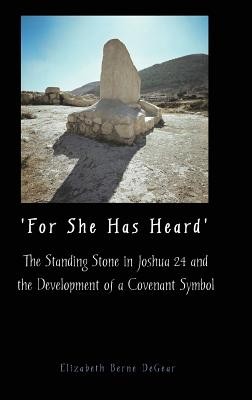
- We will send in 10–14 business days.
- Author: Elizabeth Berne Degear
- Publisher: Sheffield Phoenix Press Ltd
- Year: 2015
- Pages: 248
- ISBN-10: 1909697745
- ISBN-13: 9781909697744
- Format: 15.6 x 23.4 x 1.6 cm, hardcover
- Language: English
- SAVE -10% with code: EXTRA
Reviews
Description
In this unusual and fascinating study, Elizabeth Berne DeGear draws on both biblical studies and psychoanalytic theory to interpret the role of the standing stone erected by Joshua in the sanctuary at Shechem. The presence of a listening stone in the sanctuary distinguishes the ritual space in Joshua 24, yet this religious symbol has received little scholarly attention. DeGear begins with the question: What is this numinous feminine presence serving as witness to the people's covenantal relationship with their God? Comparing this stone's function with the function of other covenant stones in the Hebrew Bible and throughout the ancient Near East, DeGear illuminates both the power of the symbol and its dynamics in the people's religious development. In psychoanalytic mode, DeGear goes on to show how humans create and use symbols differently at various positions along the path to maturity. Her study presents a new perspective on how covenant symbols in the Hebrew Bible function in the development of the communities using them. The present analysis of this one biblical symbol offers scholars and students of biblical and religious studies the tools to engage in psychologically informed consideration of covenant. With its focus on sanctuary, symbol and psyche, DeGear's exploration of the stone extends from the world of ancient Israel to today's worship communities, where the Bible itself is used as a covenant symbol. What emerges is a picture of how the standing stone and other mediating symbols function in the religion of communities in the Bible and beyond.
EXTRA 10 % discount with code: EXTRA
The promotion ends in 20d.21:32:46
The discount code is valid when purchasing from 10 €. Discounts do not stack.
- Author: Elizabeth Berne Degear
- Publisher: Sheffield Phoenix Press Ltd
- Year: 2015
- Pages: 248
- ISBN-10: 1909697745
- ISBN-13: 9781909697744
- Format: 15.6 x 23.4 x 1.6 cm, hardcover
- Language: English English
In this unusual and fascinating study, Elizabeth Berne DeGear draws on both biblical studies and psychoanalytic theory to interpret the role of the standing stone erected by Joshua in the sanctuary at Shechem. The presence of a listening stone in the sanctuary distinguishes the ritual space in Joshua 24, yet this religious symbol has received little scholarly attention. DeGear begins with the question: What is this numinous feminine presence serving as witness to the people's covenantal relationship with their God? Comparing this stone's function with the function of other covenant stones in the Hebrew Bible and throughout the ancient Near East, DeGear illuminates both the power of the symbol and its dynamics in the people's religious development. In psychoanalytic mode, DeGear goes on to show how humans create and use symbols differently at various positions along the path to maturity. Her study presents a new perspective on how covenant symbols in the Hebrew Bible function in the development of the communities using them. The present analysis of this one biblical symbol offers scholars and students of biblical and religious studies the tools to engage in psychologically informed consideration of covenant. With its focus on sanctuary, symbol and psyche, DeGear's exploration of the stone extends from the world of ancient Israel to today's worship communities, where the Bible itself is used as a covenant symbol. What emerges is a picture of how the standing stone and other mediating symbols function in the religion of communities in the Bible and beyond.


Reviews